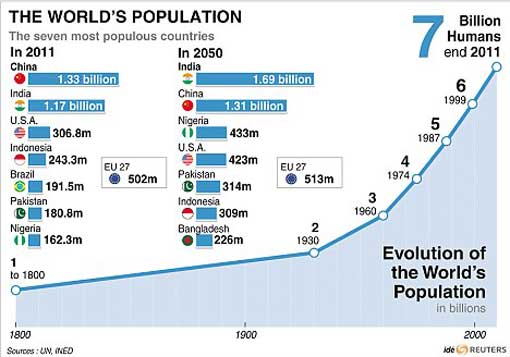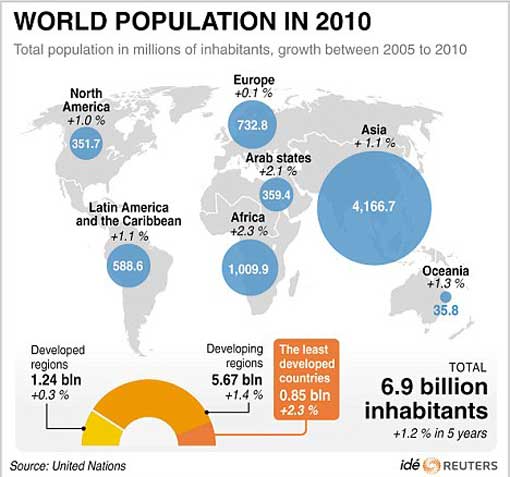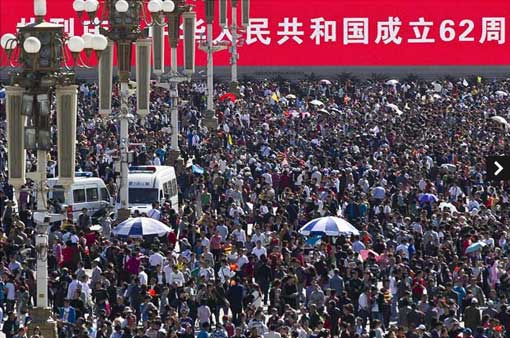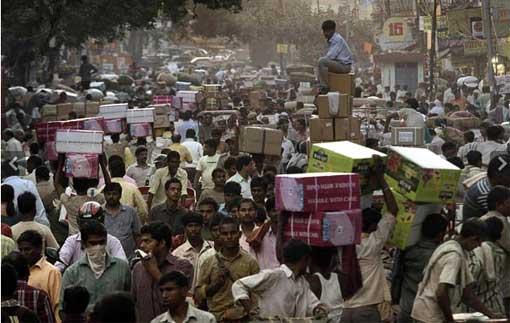World population to reach 7billion in few days (increased 1billion in 12yrs), world resources under more strain than ever before





(quote)
Room for one more? World population to reach 7 BILLION in next few days
Children most likely to be born in Asia-Pacific region
Fears over pressure on food supply and medical care
The world's population looks set to smash through the seven billion barrier in the next few days, according to the United Nations.
It comes just 12 years since the total reached six billion - with official estimates saying the figure will top eight billion in 2025 and 10 billion before the end of the century.
And it is most likely the baby will be born in the Asia-Pacific region - where the population growth rate is higher than anywhere else in the world.
Experts say the pace of growth - which has seen the number of people on the planet triple since 1940 - poses an increasing danger to citizens.
With more people to feed, house and provide medical care for, they say the world's resources look set to come under more strain than ever before.
As populations stabilise in the industrial world, almost all growth in the near future is expected to take place in developing countries.
Of the 2.3 billion people the UN believes will be added by 2050, more than one billion will live in sub-Saharan Africa. The Indian subcontinent will add some 630 million people.
It will mean less land and water available for each person. Poorer people, who tend to depend more on natural resources, will bear the brunt as they will not be able to compete with the rich.
The major issues will be how to feed the new arrivals, which will see the need for new varieties of improved crops.
Ageing populations are also set to pose a problem with some industrial countries, such as Japan, nearly doubling its share of the population aged 65 and over in the past 20 years.
This will put increased pressure on pension and healthcare systems.
The report states: 'Another two billion people may be added to the world population by mid-century, many of them in places where hunger, poverty, and environmental degradation are already taking a high toll.
'Supporting the world’s human population will mean eliminating poverty, transitioning to an economy that is in sync with the earth, and securing every person’s health, education, and reproductive choice.
'If we do not voluntarily stabilize population, we risk a much less humane end to growth as the ongoing destruction of the earth’s natural systems catches up with us.'
But despite the problems the world is facing, Under-Secretary-General of the UN Dr Noeleen Heyzer said the seventh billion child of the world has a better chance than decade ago of surviving past the age of five than a decade ago.
The life expectancy for both women and men has also increased in every Asian and Pacific country during the past decade, Dr Heyzer added.
And although the pace of development is 1.1 per cent in 2011 - meaning an extra 78 million people will live on the planet by the end of this year - it has slowed down slightly from its peak of 2 per cent in 1968.
Professor David Bloom, from the department of economics and demographics at Harvard University, said in a report earlier this year that the issues would also affect developed countries.
He said: 'Population trends indicate a shift in the 'demographic centre of gravity' from more to less developed regions.
'Already strained, many developing countries will likely face tremendous difficulties in supplying food, water, housing, and energy to their growing populations, with repercussions for health, security, and economic growth.
'The demographic picture is indeed complex, and poses some formidable challenges.
'Those challenges are not insurmountable, but we cannot deal with them by sticking our heads in the sand.
'We have to tackle some tough issues ranging from the unmet need for contraception among hundreds of millions of women and the huge knowledge-action gaps we see in the area of child survival, to the reform of retirement policy and the development of global immigration policy.
'It's just plain irresponsible to sit by idly while humankind experiences full force the perils of demographic change.'
Britain is mirroring the world's expansion. In 1801, its population was 10.5 million - and is now close to 62.5 million.
Coming soon: 7 billion reasons to rethink how we use the planet
ONE DAY this month, the world's population will reach 7 billion.
It took thousands of years - from prehistory to 1960 - for humankind to reach 3 billion. But then it took only 39 years - to 1999 - to add the next 3 billion. And now it has taken just 12 more years to move from 6 to 7 billion.
Growth has been so rapid that the US Population Reference Bureau estimates that about 5 per cent of all the people who have ever lived are living now.
The rate of growth has slowed, but some time around the middle of this century it is projected that the earth shall have 9 billion people.
That will mean that in 250 years the world's population will have increased ninefold since it reached 1 billion in 1804.
In contrast, the population at the time of Christ was probably about one-quarter of a billion, and it took 1800 years to increase fourfold to 1 billion. This period of population growth has coincided with the most technologically dynamic era of human history. The most spectacular changes have been part of the industrial revolution and more recently the digital revolution.
This has meant - in contrast to the many dire predictions that over-population would result in disaster - that population growth has also coincided with far greater longevity, and a much more comfortable and materially richer life than pre-industrial man could ever have dreamt of.
A key reason that massive population growth has not led to disaster has been the extraordinary growth in agricultural productivity.
However, while continuing dynamism in agriculture is likely, there are some indications that these benefits are starting to slow.
Global food prices showed a relative decline over some decades, but this century they have increased significantly, and some experts predict the upward trend will continue.
Moreover, some agricultural systems may already be operating beyond what is sustainable in the long term. Lester Brown, of the Worldwatch Institute, has estimated that one-third of the world's cropland is losing topsoil faster than new soil is forming. Water tables are being depleted in many countries to support agricultural production, and again this cannot continue indefinitely.
Polls have consistently shown that fewer old people believe in anthropogenic global warming than young ones. Perhaps one reason is a failure to grasp just how much the earth has changed in their lifetimes.
For someone now in their seventies, the global population now is about three times what it was when they were born.
The planetary impact of increased numbers of people can be seen, for example, in the total fish catch. The total world marine fish catch was perhaps 4 million tonnes in 1900, probably about 20 million tonnes in 1950, and 140 million tonnes in 2005.
However, more than 40 per cent of this is now drawn from aquaculture, and for fish consumption to keep increasing, aquaculture will need to continue its recent rapid development, because there is no prospect of an increasing catch from the oceans, indeed the opposite.
Despite the increasingly global reach of the industry, fish captured in the ocean have been constant at about 80 million tonnes since the late 1980s; seven of the top 10 marine fish species are fully exploited or over-exploited; and the average size of the fish caught has decreased.
The increase in the number of people is only part of the equation. Equally important is their rising expectations. As the standard of living increases, so over the generations does the average "carbon footprint" of each individual.
We can see this most easily in the growing number of cars. In 1900, there may have been about 20,000 cars in the world; by 2002 there were about 800 million.
The Institute for Transport Studies at Leeds University estimates that by 2030 there will be more than 2 billion, with most of the increase coming outside the developed world.
But this is a case of where increasing population mixed with the revolution of rising expectations meets planetary boundaries. Oil supplies are not endlessly elastic. Some estimates say that peak oil - the maximum conventional oil production - may already have been reached.
Whether or not that is true, it seems certain that the cost of oil is going to increase substantially in coming decades as still rising demand meets more difficult and more expensive supply.
At some stage, the price may rise sufficiently to challenge many of the transport assumptions on which our present order is based.
We live in a political system in which a week is considered a long time, and so much political and media energy is focused on the short term. But to be short-sighted means we will not be prepared for the inevitable changes that will play out in the coming decades and generations.
The economist Kenneth Boulding once observed that "anyone who believes exponential growth can go on forever in a finite world is either a mad man or an economist".
Want a real Halloween scare? The planet's population will reach 7 billion by Oct. 31.
That's according to the United Nations Population Fund, which is trying to use that staggering figure as a wake-up call and an opportunity to harness the world's resources -- and not just resources of the food and water kind -- for the greater good.
"It's a big number," Omar Gharzeddine, a spokesman for the population fund, told The Times. "We're confident that, while it's a challenge, it's also an opportunity with all of the young people in the world and how we can change."
The fact that the milestone figure could be reached on Halloween is coincidence and not commentary, he said. The projection is based on the U.N.'s census data and birth rate information, but experts are already haggling over whether the data are accurate or not. The U.S. Census Bureau reportedly predicts a February 2012 due date.
And buckle up for the inevitable media race to anoint the 7 billionth person. Plan International, an international child advocacy agency, is planning to seize that limelight on Oct. 31, according to Live Science. It will present a 7-billionth-person birth certificate to a baby girl in Uttar Pradesh, India's most populous state, in a bid to draw attention to the problem of sex-selective abortions in that country.
Regardless, it seems that everyone can agree that Mother Earth's population continues to grow by leaps and bounds -- and won't slow down anytime soon.
That recognition could help shape global policies going forward, even as authorities grapple to understand what the population growth will mean and how the world should respond. No doubt, there are politically charged discussions about family planning and birth control on the horizon, as well as tough decisions about how to best help areas of the world burdened by poverty and hunger.
Here are some U.N. projections to mull over with a handful of candy corn:
-- Looking ahead, the U.N. projects that the world population will reach 8 billion by 2025, and 10 billion by 2083. But it cautions that those numbers are mere projections, and could veer dramatically with changes such as access to birth control.
-- Average life expectancy is also expected to continue rising, but again that depends on a number of factors. Today, 893 million people are 60 or older. But by the middle of this century that number will nearly triple, to reach 2.4 billion, according to the population fund. Globally speaking, today's average life span is 68 years, compared with 48 in 1950.
-- The population explosion will be especially felt in cities around the globe. Right now, one in two people live in an urban area. In about 35 years, two out of three will.
China and India have topped the position of most populated countries with huge population of 1.3billion and 1.2billion, respectively. The UK has 62.3million. Asian and African countries are observed to have higher birth rates and lower death rates.
7 Billionth Person Will Be Born By Halloween [Report]
In an even scarier scenario the fund believes that Earth’s population will reach 8 billion people in just 14 more years.
After reaching 1 billion estimated people in 1804 humans spent 123 years reaching 2 billion. With energy prices already rising astronomically along with the cost of food some analysts are worried that we could reach a tipping point based off rising population numbers.
A Fund researcher for the project says of the population increases:
"For the rich, it’s totally manageable," while adding, "It’s the poor, everywhere, who will be hurt the most."
The Population Funds director points out that one of the biggest problems with population explosions is that more than 215 million women worldwide don’t have access to family education and therefore lack the understanding of family planning.
If those numbers are not scary enough it’s also estimated that we will reach 9.3 billion people by 2050 while the world’s population will skyrocket to 10.1 billion by 2100.
Considering that humans essentially act like viruses by moving into a space and destroying everything they need to live off I find these numbers to be scary for humanities future. Do you find the number of people on Earth to be frightening?
*Update Nov. 11, 2011*
Feeding 7 billion and our fragile environment
(unquote)
Images courtesy Reuters, AP Photo / Andy Wong, AP Photo / Manish Swarup, Todd Korol / Reuters, and Nicky Loh / Reuters
Reply








